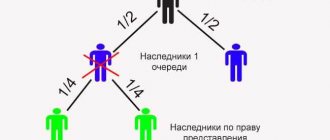Who can claim part of the inheritance?
Relatives and people included in the will become applicants. The legislation of the Russian Federation presupposes a sequence according to which the inheritance passes to the disposal of the first-priority heir:
- children;
- spouses;
- parents.
The next six stages allow you to divide the property according to the law. Mandatory shares in inheritances according to the Civil Code of the Russian Federation are a part of the inheritance allocated from the total amount intended to provide housing.
The will determines the eighth line of inheritance. The document is the lifetime expression of the will of the testator and is drawn up by a notary. According to the expression of will, a share or the entire inheritance is transferred to specific persons indicated in the text. The paper is a strict guide for execution. However, here too, a share is allocated from the inheritance under Article 1149. The most important things are contained in the second, third and fourth points.
Deprivation of compulsory share
According to paragraph 4 of Article 1149 of the Civil Code of the Russian Federation, the obligatory part of the inheritance may be reduced or not provided at all in cases where, due to the award of part of the property, it is impossible to satisfy the requirements of the successor under the will (the legal heir uses the property, and it is vital for him).
The norm applies to real estate : houses, apartments and other residential premises, as well as creative workshops and other objects that are used as the main source of income.
Reference . The procedure for deprivation of rights to inheritance occurs exclusively in court. They also challenge the application if they are illegally trying to deprive a citizen of his due share.
Deprivation of an appropriate part of the inheritance also occurs in cases where a person:
- falsified data in order to obtain title to property;
- committed an illegal act against the legal heir;
- through fraudulent actions, increased its share of the inheritance.
Under such circumstances, the court recognizes citizens as unworthy successors and removes them from the further inheritance process (Article 1134 of the Civil Code of the Russian Federation “Executor of a will”).
Additional information to Article 1149 of the Civil Code of the Russian Federation
Disabled relatives have the right to receive a mandatory share of the inheritance on an equal basis with other heirs, both by law and by will. These are legitimate children who do not work due to their minorities. If the other half or parents cannot earn money due to poor health, they are also given a portion of the inheritance. This also includes dependents who were supported during the life of the testator.
The rights of such citizens are determined by Article 1148 of the Civil Code of the Russian Federation in the first two paragraphs. The allocation of a share is the only restriction imposed on the official expression of the will of the deceased. Legislation thus takes care of people who do not have the opportunity to earn their own living due to independent reasons (minority, lack of health, congenital pathologies). Those who have the right to such a share get a chance to exist normally even after the death of the person who cared for him earlier.
To exercise your rights to a compulsory share, you must go to court. This can be done independently or through a trusted person. Most often, this is a lawyer who defends the interests of the principal at all stages. An initial consultation can always be obtained free of charge by phone or online. The only obstacle to allotment is recognition as an unworthy heir.
Even if there are special conditions and the size of the obligatory share is reduced, half of what is required by law remains with the obligatory heir. If the age of majority is reached during the year preceding the date of opening of the inheritance, all rights to claims are reserved. The same applies to situations if the ability to work has been restored. In any case, if there is intestate property, then the difference between the expected and actual volume of the inherited estate is taken from the shares of the participants in the process.
Article 1149 of the Civil Code of the Russian Federation. The right to an obligatory share in the inheritance (current version)
According to paragraph 4 of the commented article, if the exercise of the right to an obligatory share in the inheritance entails the impossibility of transferring to the heir under the will property that the heir entitled to the obligatory share did not use during the life of the testator, but the heir under the will used for living (a residential building , apartment, other residential premises, dacha, etc.) or used as the main source of livelihood (tools, creative workshop, etc.), the court may, taking into account the property status of the heirs entitled to the obligatory share, reduce the amount of the obligatory share or refuse to award it. As follows from this article, we are not necessarily talking about premises recognized as residential in the manner prescribed by law (dacha, etc.). Moreover, this provision was adopted from the practice of the Constitutional Court of the Russian Federation (see Determination of the Constitutional Court of the Russian Federation of December 9, 1999 N 209-O “On the refusal to accept for consideration the complaint of citizen Elena Anatolyevna Kurkina about the violation of her constitutional rights by Article 535 of the Civil Code of the RSFSR” In this Determination it was noted that the restriction of the right of an heir under a will does not contradict Article 55 (Part 3) of the Constitution of the Russian Federation, which provides for the possibility of limiting by federal law the rights and freedoms of man and citizen only to the extent and only to the extent that this is not is only presumed, but is actually necessary in order to protect the rights and legitimate interests of other persons.
Obligatory heirs receive a separate certificate of right to inheritance. In this case, the obligatory heir must confirm to the notary the marriage, family relations, adoption or dependency.
According to paragraph 31 of the Methodological Recommendations for Registration of Inheritance Rights, if the heirs under a will object to the issuance of a certificate of the right to an obligatory share in the inheritance, the notary explains that the dispute that has arisen is resolved in court and the decision on the issue of issuing a certificate of the right to inheritance can be postponed in accordance with the procedure , provided for in Art. 41 Fundamentals of the legislation of the Russian Federation on notaries.
As follows from paragraph 32 of the Resolution of the Plenum of the Supreme Court of the Russian Federation dated May 29, 2012 No. 9 “On judicial practice in inheritance cases,” “when resolving issues regarding the exercise of the right to an obligatory share in the inheritance, the following must be taken into account:
a) the right to an obligatory share in the inheritance is the right of an heir by law from among the persons named in paragraph 1 of Article 1149 of the Civil Code of the Russian Federation to receive inherited property in the amount of at least half of the share that would be due to him upon inheritance by law, in cases where, by virtue of such heir does not inherit from the will or the part of the bequeathed and intestate property due to him does not amount to the specified amount;
b) the rules on compulsory share established by Article 535 of the Civil Code of the RSFSR apply to wills made before March 1, 2002;
c) when determining the size of the obligatory share in the inheritance, one should proceed from the value of all inherited property (both in the bequeathed and intestate part), including items of ordinary home furnishings and household items, and take into account all heirs by law who would be called upon to inheritance of this property (including heirs by right of representation), as well as heirs by law, conceived during the life of the testator and born alive after the opening of the inheritance (clause 1 of Article 1116 of the Civil Code of the Russian Federation);
d) the right to an obligatory share in the inheritance is satisfied from that part of the inherited property that is bequeathed only in cases where all of the inherited property is bequeathed or its untested part is insufficient to exercise the said right.
Requirements for priority satisfaction of the right to an obligatory share in the inheritance at the expense of bequeathed property if there is sufficiency of intestate property, including with the consent of the heirs under the will, are not subject to satisfaction (even if, when satisfying the right to an obligatory share at the expense of intestate property, the remaining heirs according to the law, inherited property is not transferred);
e) if an exclusive right is included in the inheritance, the right to an obligatory share in the inheritance is satisfied taking it into account;
f) an heir who has not demanded the allocation of a mandatory share in the inheritance is not deprived of the right to inherit by law as an heir of the corresponding line.”
5. The commented article was supplemented by clause 5. As is known, according to previously existing legislation, the right to an obligatory share had to be exercised in all cases, regardless of the type of will. As for inherited funds, the situation is not so clear. According to Art. 3 of Federal Law No. 259-FZ of July 29, 2021 “On Amendments to Parts One, Two and Three of the Civil Code of the Russian Federation,” an heir who has the right to a compulsory share and is a beneficiary of the inheritance fund loses the right to a compulsory share. If such an heir, within the period established for accepting the inheritance, declares to the notary leading the inheritance case that he renounces all rights as a beneficiary of the inheritance fund, he has the right to an obligatory share in accordance with this article.
Thus, the heir has the right to choose: either become a beneficiary and renounce the obligatory share, or renounce the rights of the beneficiary of the inheritance fund and receive the obligatory share. If the heir renounces the rights of a beneficiary of the inheritance fund, the court may reduce the size of the compulsory share of this heir if the value of the property due to him as a result of the inheritance significantly exceeds the amount of funds necessary for the maintenance of the citizen, taking into account his reasonable needs and available to him on the date of opening of the inheritance obligations to third parties, as well as the average amount of expenses and standard of living before the death of the testator.
How is Article 1149 of the Civil Code of the Russian Federation applied in practice?
Each case is different, and there is no single solution to the issue. The judge uses the basic postulates specified in legislative acts. One has to face various conditions and situations, but a solution is always found and depends on the evidence that the parties are right. To understand how and in what position the law applies to compulsory heirs, it is better to consider several examples.
Example 1
After the death of Smirnov A.P. according to the will, the inheritance passes to the nephew. However, he has a legitimate son. Despite the fact that when the notary opened the inheritance case, it became known about the expression of will, Smirnov’s ex-wife V.A filed a claim for the allocation of a compulsory share to their son. Considering that the nephew lived with Smirnov because he was an orphan, the judge decided to satisfy the demands.
In the process of determining the things that should go as a mandatory share, Smirnova applied for an apartment, but this demand was denied. It is necessary to take into account the value of the inheritance, and Smirnova, on the basis of guardianship, received a share consisting of the property of the deceased. The calculation took into account their value at market prices. Success was ensured by a professional lawyer.
Example 2
Epifanova's son S.V., being disabled from birth, became a hostage to a similar situation. The father was not married to the mother, and he has a wife and daughter. The latter receives the house in the will. This right is undeniable. The wife legally gets everything else. But Epifanova filed a lawsuit, and regardless of whether she provides evidence of disability, she has the right to an obligatory share of the inheritance through kinship. As the guardian of her minor son, the car and the dacha were transferred to her under a property appraisal act.
Example 3
Parents who are disabled and infirm are entitled by law to a portion of the inheritance. A mandatory share is more likely to be assigned if they lived with the deceased son or daughter. Advantages are based on the right to joint ownership, degree of relationship and disability. The court ruling contains a requirement to allocate square meters of housing and transfer into ownership the personal belongings of the deceased from the untested share of the inheritance.
Comments to Art. 1148 Civil Code of the Russian Federation
Depending on the queue, the closest relatives currently living receive the corresponding privileges. The absence of an intermediate link deprives a person of a place in the order of inheritance. The law states that the minimum period that must be a dependent in order to obtain the right to claim an obligatory share of the inheritance is one year. The same amount is given in cases where these persons have regained their ability to work or have reached adulthood. If this requirement is violated, inheritance occurs according to law based on priority.








